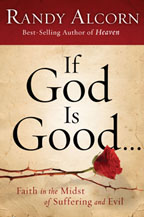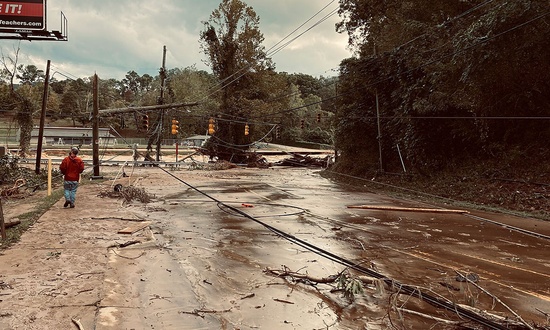The moral evil of Earth's stewards caused God to curse Earth with natural disasters.
Many people blame God for natural disasters. “How could he allow this?” they ask. But what if the Architect and Builder crafted a beautiful and perfect home for Earth’s inhabitants, who despite his warnings carelessly cracked its foundation, punched holes in the walls, and trashed the house? Why blame the builder when the occupants took a sledgehammer to their own home?
Fatalities caused by natural disasters multiply because of morally evil human actions. People frequently cause forest fires and other large-scale disasters. They build houses in areas long proven vulnerable to floods, landslides, fires, tornadoes, and earthquakes. Some perish when they refuse warnings to vacate their homes.
Humans misuse land, resulting in disastrous mud slides. Polluted rivers cause deaths and physical deformities. More people may suffer losses from looting following a hurricane than in the hurricane itself. National leaders may hoard aid sent to help their dying people. People may fail to generously share their God-given resources to rescue the needy.
Natural disasters become most disastrous when they take human life—but they never did so until after humans committed moral evil against God.
God placed a curse on the earth due to Adam’s sin (see Genesis 3:17). That curse extends to everything in the natural world and makes it harder for people to live productively. Paul says that “the creation was subjected to frustration” by God’s curse, until that day when “the creation itself will be liberated from its bondage to decay” (Romans 8:20–21). The next verse says, “The whole creation has been groaning as in the pains of childbirth.” Earthquakes, volcanoes, and tsunamis reflect the frustration, bondage, and decay of an earth groaning under sin’s curse.
Natural disasters are not inherently evil, but they can produce secondary evils by thwarting the good of human, animal, and environmental welfare.
Earthquakes and tsunamis are not moral agents and therefore cannot be morally evil. A tidal wave is not malicious—water cannot have malice any more than it can have kindness.
The best answer to the question “Why would God create a world with natural disasters?” is that he didn’t. Many experts believe the world’s atmosphere originally acted like an umbrella, protecting its inhabitants from harm. But now the umbrella has holes in it, sometimes protecting us, sometimes not. While Barbara Ehrenreich blames God for death and disaster, Scripture blames human evil for the cataclysmic Fall and consequent distortion of a once-perfect world (see Romans 8:18–22).
People who have survived disasters often say they understand on a far deeper level the biblical truth that this world as it now is—under the Curse—is not our home.
God is sovereign over all nature.
Good weather and bad both come at God’s discretion. The meteorologist may explain wind speeds by differences in air pressure, but Scripture says of God, “He makes his wind blow” (Psalm 147:18, ESV). Blowing winds would seem to include hurricanes and tornadoes.
God “brings the clouds to punish men, or to water his earth and show his love” (Job 37:13). Israel’s grumbling angered God: “Then fire from the LORD burned among them and consumed some of the outskirts of the camp” (Numbers 11:1; see also Job 37:3, 6; Psalm 29:5, 7; 147:16–18; Jeremiah 14:22).
Jesus said of God, “He causes his sun to rise on the evil and the good, and sends rain on the righteous and the unrighteous” (Matthew 5:45). Note that he did not say, “God created natural laws and lets the course of nature go its own way.” Those who argue that God has given the operation of the world over to Satan contradict these passages.
The Bible never speaks of nature as an impersonal mechanism. Nature does not govern the universe; God does.
This doesn’t mean that Satan, called “ruler of this world” (John 12:31, ESV), and “prince of the power of the air” (Ephesians 2:2, ESV), doesn’t have power over weather. Even when Christ calmed the Sea of Galilee, it may speak of his primary power over the secondary powers of pagan demon gods.
The synonym for natural disasters is an act of God. Interestingly, beautiful weather isn’t widely referred to as “an act of God.”
Sometimes God uses natural disasters to punish evil.
God brought the Great Flood upon humanity as a judgment for sin (see Genesis 6–8). He opened the earth to swallow Korah, Dathan, and Abiram, because they had treated him “with contempt” (Numbers 16:30).
God exercised judgment by orchestrating plagues (see Exodus 7–12; Numbers 11:33; 1 Samuel 5:6–9), sending hordes of locusts (Joel 2:25), and releasing swarms of snakes (Numbers 21:4–6).
When the “LORD rained down burning sulfur on Sodom and Gomorrah” (Genesis 19:24), he told Abraham and Lot that he had destroyed the cities because of their sin (see Genesis 18:20, 21; 19:12–13).
Jonah’s disobedience prompted God to send a storm to rock the ship that carried Jonah (see Jonah 1:12).
God said, “I gave you empty stomachs in every city and lack of bread in every town.... I also withheld rain from you when the harvest was still three months away.... Many times I struck your gardens and vineyards, I struck them with blight and mildew” (Amos 4:6–7, 9).
Likewise, after saying he would bless them with rain to help grow crops, he warns his people that if they disobey, he would bring down curses, including drought (see Deuteronomy 28:15–68).
Natural disasters ordinarily are general results of the Curse, not specifically linked to the sins of individuals who perish or suffer in them.
Some Christian leaders have embarrassed themselves by pointing to various natural disasters as “God’s judgment on sin.” How would they know? And if it were true for some of those who died, what about the righteous who died alongside them?
Unless God clearly reveals it, we should never assume that a natural disaster or moral atrocity comes upon this earth as his specific judgment on specific people. Jesus made this clear by saying that some people murdered by Pilate and those crushed by a falling tower were no worse sinners than others (see Luke 13:2–5).
Scripture does not distance God from disasters and secondary evils the way his children often do.
God makes an unapologetic statement about himself: “I form the light and create darkness, I bring prosperity and create disaster; I, the LORD, do all these things” (Isaiah 45:7).
As we saw in Jeremiah 11:17 and 32:23, so in Isaiah 45 God brings ra, disastrous consequences, to deal with people’s ra, moral evil. God righteously brings terrible judgment upon human evil.
Amos 3:6 says, “When disaster [ra] comes to a city, has not the LORD caused it?” A description of natural disasters follows in Amos 4:6–12, where God says he brought hunger, drought, blight, mildew, locusts, pestilence, and the death of men and horses, “yet you have not returned to me” (verse 11). God intended these disasters not only as punishment, but as discipline designed to draw his people back to himself.
Even when Satan is behind natural disasters and diseases, God hasn’t relinquished his world-governing power.
Some authors emphasize that Satan, not God, brings natural disasters, inflicts diseases, orchestrates tragedies, and takes lives. And some passages appear to support that view, including those in the gospels that ascribe demon affliction to certain diseased people.
The book of Job draws back the curtain into the invisible realm, revealing how God and Satan relate in a case of great human adversity that included two natural disasters:
Then the LORD said to Satan, “Have you considered my servant Job? There is no one on earth like him; he is blameless and upright, a man who fears God and shuns evil.”
“Does Job fear God for nothing?” Satan replied. “Have you not put a hedge around him and his household and everything he has? You have blessed the work of his hands, so that his flocks and herds are spread throughout the land. But stretch out your hand and strike everything he has, and he will surely curse you to your face.”
The LORD said to Satan, “Very well, then, everything he has is in your hands, but on the man himself do not lay a finger.”
Then Satan went out from the presence of the LORD. (Job 1:8–12)
Satan incited the Sabaeans to murder Job’s servants and steal his oxen and donkeys. Then one of Job’s servants said, “The fire of God fell from the sky and burned up the sheep and the servants” (verse 16). Next, Chaldean raiding parties stole camels and murdered more servants (see verse 17). Finally, while Job’s sons and daughters feasted in “the oldest brother’s house... suddenly a mighty wind swept in from the desert and struck the four corners of the house. It collapsed on them and they are dead” (verses 18–19).
Were the Sabaeans and Chaldeans responsible for committing the murders and theft? Yes. Was Satan responsible for inciting them? Yes. He brought about two “natural” disasters of severe lightning and gale-force winds.
So, Satan may bring about a natural disaster, but the book of Job makes clear that God continues to reign, even while selectively allowing Satan to do evil things. Satan knew he didn’t have the authority to incite humans to do evil, to bring down lightning to cause fires, or to send the wind to blow down a building and take lives without God’s explicit permission. We should know this too.
 Some disasters fall on the blameless.
Some disasters fall on the blameless.
Since God identified Job as the most righteous of men (see Job 1:1, 8; 2:3), the book of Job forever refutes the notion that every tragedy that befalls people is a judgment on their sin. While no one is sinless, and bad things do not happen to morally perfect people (because there are no morally perfect people), they can and sometimes do happen to the best people.
God is free in our lives, as he was in Job’s, to permit personal or natural disasters for his own sovereign purposes without ever being an evildoer.
For more information on this subject, see Randy Alcorn’s book If God Is Good …
Photo by Shashank Sahay on Unsplash





